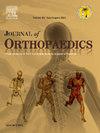内收管阻滞对全膝关节置换术结果的影响:单中心、历史队列研究。
IF 1.5
Q3 ORTHOPEDICS
引用次数: 0
摘要
背景:内收管阻滞(ACBs)与全膝关节置换术(TKA)后疼痛的减轻有关。关于这些早期差异是否会影响长期结果的证据不足。本研究旨在确定在TKA中使用ACB是否与早期和晚期预后的改善有关。方法:回顾性评估2021年至2022年间接受单侧TKA的患者的疼痛评分、首次活动时间和前72小时内阿片类药物的使用情况。6周时,评估并发症、疼痛评分和阿片类药物的使用情况。在12个月时,评估患者报告的结果测量(PROMs)和患者对手术的满意度。结果:262例单侧TKA,其中行ACB治疗组129例,未行ACB治疗组133例。ACB组第1天疼痛中位数明显降低(中位数差值-0.44(-0.09至-0.79),p = 0.015)。两组在24小时后疼痛、活动时间或72小时以上阿片类药物使用方面无显著差异。6周时疼痛(p = 0.892)、阿片类药物使用(p = 0.913)或并发症(p = 0.348), 12个月时PROMs (p = 0.436和p = 0.307)、阿片类药物使用(p = 0.187)或手术满意度(p = 0.262)的中位变化无显著差异。结论:ACBs与第1天中位疼痛的临床差异无统计学意义。与24小时后疼痛、阿片类药物使用、活动时间或长期结果无关。我们的研究结果不支持在TKA期间使用常规ACB。本文章由计算机程序翻译,如有差异,请以英文原文为准。
The effect of adductor canal block on outcomes of total knee arthroplasty: A single centre, historical cohort study
Background
Adductor canal blocks (ACBs) have been associated with reduced pain following total knee arthroplasty (TKA). There is a paucity of evidence regarding whether these early differences impact longer term outcomes. This study aimed to identify whether using ACB in TKA was associated with improvements in both early and late outcomes.
Methods
Patients who underwent a unilateral TKA between 2021 and 2022 were retrospectively assessed for pain scores, time to first mobilization and opioid use over the first 72 h. At 6 weeks, complications, pain scores and opioid use were assessed. At 12 months validated patient reported outcome measures (PROMs) and patient satisfaction with their surgery were assessed.
Results
262 unilateral TKA, of whom 129 received ACB (ACB group) and 133 did not (control group) were assessed. The ACB group had significantly lower median day 1 pain (median difference −0.44 (−0.09 to −0.79), p = 0.015). There was no significant difference between groups for pain after 24 h, time to mobilization or opioid use over 72 h. There was no significant difference in pain (p = 0.892), opioid use (p = 0.913) or complications (p = 0.348) at 6 weeks, or median change in PROMs (p = 0.436 and p = 0.307), opioid use (p = 0.187), or satisfaction with surgery (p = 0.262) at 12 months.
Conclusion
ACBs were associated with a clinically insignificant difference in median pain on day 1. there was no association with pain after 24 h, opioid use, time to mobilization or longer term outcomes. Our findings do not support the use of routine ACB during TKA.
求助全文
通过发布文献求助,成功后即可免费获取论文全文。
去求助
来源期刊

Journal of orthopaedics
ORTHOPEDICS-
CiteScore
3.50
自引率
6.70%
发文量
202
审稿时长
56 days
期刊介绍:
Journal of Orthopaedics aims to be a leading journal in orthopaedics and contribute towards the improvement of quality of orthopedic health care. The journal publishes original research work and review articles related to different aspects of orthopaedics including Arthroplasty, Arthroscopy, Sports Medicine, Trauma, Spine and Spinal deformities, Pediatric orthopaedics, limb reconstruction procedures, hand surgery, and orthopaedic oncology. It also publishes articles on continuing education, health-related information, case reports and letters to the editor. It is requested to note that the journal has an international readership and all submissions should be aimed at specifying something about the setting in which the work was conducted. Authors must also provide any specific reasons for the research and also provide an elaborate description of the results.
 求助内容:
求助内容: 应助结果提醒方式:
应助结果提醒方式:


